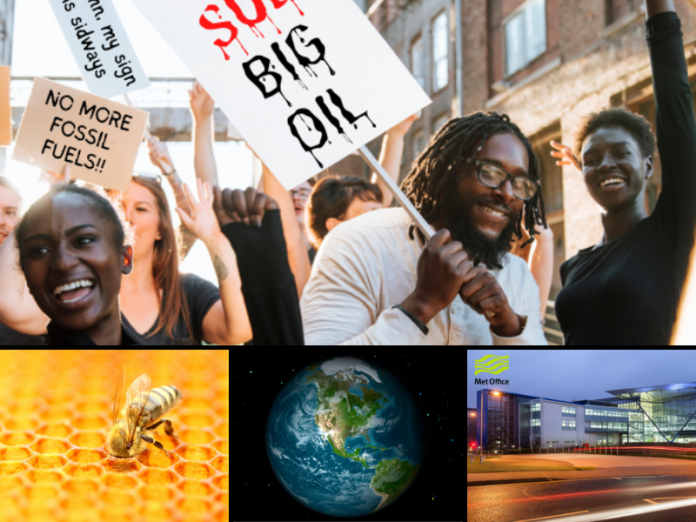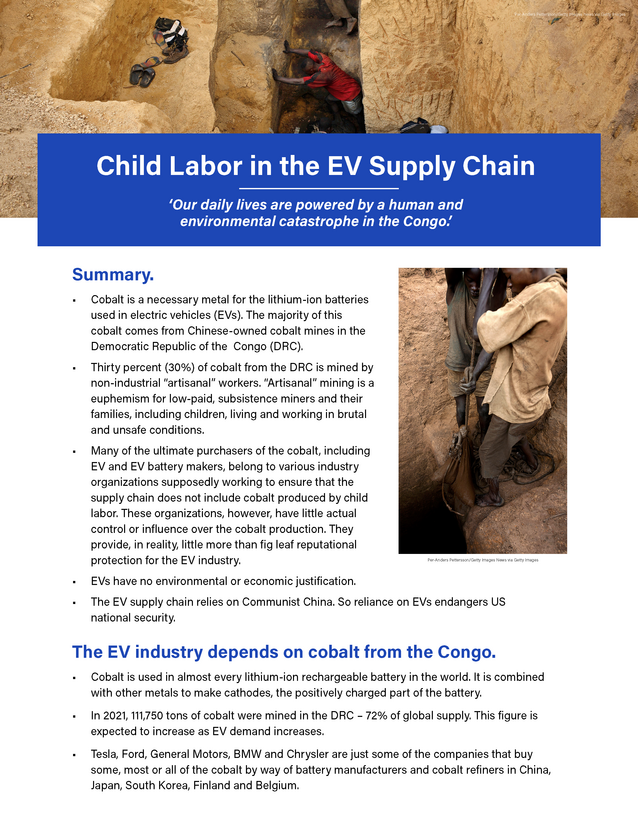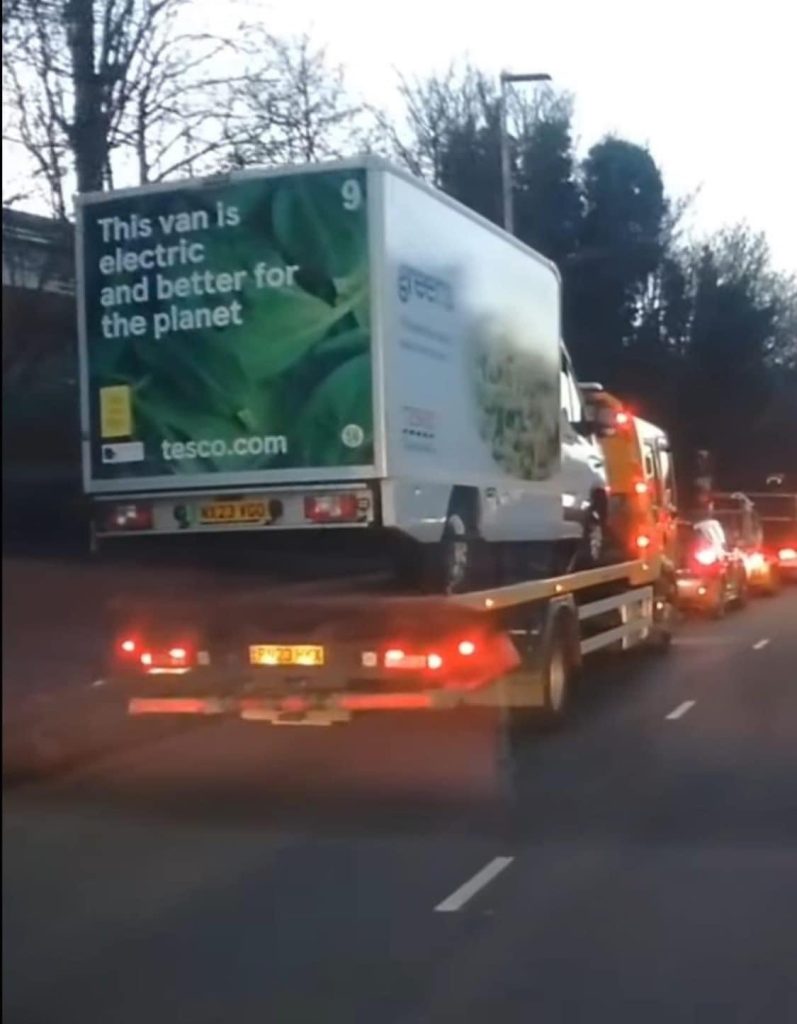YOU SHOULD SUBSCRIBE TO CLIMATE CHANGE WEEKLY.
IN THIS ISSUE:
- Chicago Follies: Windy City Joins Climate Lawfare Money Grab
- Video of the Week: The CO2 Dilemma
- Honey Bees Thriving Amid Climate Change
- CO2-Induced Greening Speeding Up Globally
- Met Office Refuses to Retract Extreme Weather Lies
- Podcast of the Week: States Have Granted Big Banks the Right to Seize Your Property
- Climate Comedy
- Recommended Sites
Watch ALL the Presentations by the ALL-STARS of Climate Realism at the Archive of Heartland’s 15 Climate Conferences
Chicago Follies: Windy City Joins Climate Lawfare Money Grab

The City of Chicago recently joined a long list of cities, states, organizations, and climate activist law firms (supposedly representing youths, most of who are now adults) suing big oil companies for their supposed climate sins.
There is an old saying, better late than never, but in the case of this lawsuit, it would be more accurately phrased, better never, than ever.
As my colleague Chris Talgo recently noted concerning this lawsuit, it’s all about the Benjamins, because there is no evidence Chicago’s city services, its residents, or visitors have been harmed by climate change. Talgo wrote:
I can’t help but wonder if this is a desperate money grab seeing as how Chicago is facing a $540 million budget shortfall in 2024. I also wonder if the recent influx of migrants to Chicago, which is costing the city millions of dollars per week, played a role in the lawsuit. After all, Mayor Johnson has been out and about hat in hand begging for funds from Cook County, the state of Illinois, and even the federal government to cover the cost of the migrant situation.
…
Last year, Chicago Mayor Brandon Johnson sued Hyundai and Kia based on the absurd allegation that the vehicles they make are too easy to steal. Now, Johnson has set his sights on “Big Oil,” claiming that British Petroleum, Chevron, ConocoPhillips, Exxon Mobil, Phillips 66, Shell, and the American Petroleum Institute deceived “Chicago consumers about the climate dangers associated with their products.”
…
According to the complaint, the six companies engaged in “deception around their products’ role in causing climate change” and face charges of “Failure to Warn, Negligence, Public Nuisance, Civil Conspiracy, Unjust Enrichment, and violations of Chicago’s municipal codes concerning Consumer Fraud and Misrepresentations in Connection with Sale or Advertisement of Merchandise.”
The lawsuit seeks “relief in the form of compensatory and loss-of-use damages, penalties and fines for statutory violations… as well as associated fees, interest, and other relief as deemed appropriate by the jury at trial.”
What can Chicago point to as identifiable harm from “climate change?” Nothing. Lake Michigan has no clear trend of rising or falling due to climate change, rather for a few years it’s up and a few years it’s down, its levels varying as they have throughout history. Flooding hasn’t increased in frequency or severity. Nor have heat waves or droughts increased in the region. And cold spells and heavy snow have declined a bit, meaning fewer people are dying from non-optimum temperatures. Crop production in Illinois has improved amid modest warming, thanks in part to CO2 fertilization and a decline in late season frosts—so where is the climate harm? None can be identified.
Such suits have been going on for nearly a decade, with the first city lawsuit filed against “big oil,” I believe out of Oakland and San Franciso, in 2017. But, more broadly, thousands of state and federal lawsuits have been filed against oil companies based on purported climate harms over the past few decades by environmental lobbying groups, before cities and various other interested (in cashing in) parties jumped on the bandwagon. Although, undoubtedly, each of the various cases make multiple claims, with many of the same claims made in different lawsuits, still the Columbia University’s Sabin Center for Climate Change Law list hundreds of climate-related lawsuits over the years, with more than two dozen cities involved currently in such lawsuits. Chicago is really late to the game.
The track record for the lawsuits thus far is mixed. Some have been dismissed or lost, some were lost only to be restarted on appeal, and some are moving forward, in various stages of discovery or preliminary motions. The one point on which big oil has fought and lost—pretty consistently thus far—is their attempt to have lawsuits that were filed in state courts removed to federal courts.
In 2018, Judge William Alsup, of the U.S. District Court for the Northern District of California, dismissed a lawsuit brought by the cities of Oakland and San Francisco that argued five oil companies should be held liable for harms allegedly caused by climate change.
Alsup determined Congress and the president were best suited—as opposed to cities, states, or the judiciary—to determine what, if anything, to do about carbon dioxide emissions from the use of fossil fuels.
“[P]laintiffs’ claims require a balancing of policy concerns … Importantly, ‘[t]he political branches, not the Judiciary, have the responsibility and institutional capacity to weigh foreign-policy concerns,’” wrote Alsup.
Going further, Alsup stated the any potential harms of fossil fuel emissions must be weighed against the tremendous benefits they deliver.
“We must weigh this positive: our industrial revolution and the development of our modern world has literally been fueled by oil and coal,” Alsup said. “Without those fuels, virtually all of our monumental progress would have been impossible. Having reaped the benefit of that historic progress, would it really be fair to now ignore our own responsibility in the use of fossil fuels and place the blame for global warming on those who supplied what we demanded?”
Indeed, I am unaware that Chicago’s mayor regularly takes public transit to work or on personal or public business (historically, the city’s mayors have often ridden in a motorcade, with none of the vehicles being electric). Public transit ridership has declined dramatically in recent years. The previous mayor said, “[t]he practical reality is we are a car city,” which most residents know because they do most of the driving. The city’s first responder vehicles, fire trucks, police vehicles, ambulances, municipal water and waste vehicles, and snowplows, etc., are fossil-fuel powered, and nuclear and coal account for most of the electricity in Illinois, keeping Chicago’s lights on.
The city government and its residents rely on and benefit daily from the product the big six oil companies they are suing provide—where is the fairness, justice, or sanity in that. The lawsuit is hypocrisy at its worst. Oil and gas are not addictive. Big oil didn’t get anyone hooked, and big oil can’t know what science can’t, in fact, show that carbon dioxide emissions are causing catastrophe in Chicago. Even if they were, it would be the users of the product, not those who produce it, who are to blame for the emissions and, thus, any attendant harm.
How much money will Chicago spend on this lawsuit, which may or may not succeed, that could have been better spent (by which I mean to greater direct effect on improving average Chicagoan’s lives) on the city’s poorly maintained infrastructure, its failing schools and public hospitals, and funding new officers and programs to reduce crime? And, how much money will oil and gas companies expend in fighting this lawsuit and others filed previously that might have been better spent developing cleaner technologies and fuels or simply providing the energy we use now at a cheaper price by increasing investment in new production?
Big oil and all the ancillary companies in the industry have powered America’s and, yes, Chicago’s progress. Lawfare does nothing productive other than lining the pockets of lawyers and furthering the political ambitions of green virtue signaling politicians who don’t live the low-carbon lifestyles they espouse for others.
Sources: Columbia Law School; Climate Change Weekly; WTTW News; City of Chicago; American Thinker
Get your Copy at Amazon TODAY!
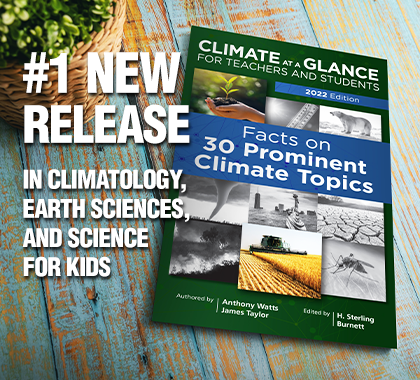
Video of the Week
Climate change issues all center around increasing carbon dioxide (CO2) in Earth’s atmosphere, however what is seldom mentioned by climate alarmists is the fact that CO2 can be both a benefit as well as a detriment. From the climate alarmism point of view CO2 is nothing but bad. But that’s really not true.
Read the brutal truth about how battery production for electric vehicles cause immense environmental destruction and human tragedy.
Honeybees Thriving Amid Climate Change

Climate activists’ claims that honeybee populations are in dramatic decline due to climate change are regularly reported as fact by the mainstream media. Climate Realism has repeatedly refuted such claims. In a recent article, Vijay Jayaraj, a research associate at the CO2 Coalition, discussed recent data and research that shows honeybee populations have grown dramatically amid recent modest warming.
Globally, the number of managed honeybee colonies has been steadily increasing over the past several decades. According to the Food and Agriculture Organization of the United Nations (FAO), the estimated number of colonies worldwide climbed by 46% between 1990 and 2021. That is a phenomenal increase and makes us wonder how we’ve been fooled into thinking otherwise.
As Jayaraj points out, the growth in honeybee colonies is not limited to just a few countries or regions of the globe but rather was the norm across the world between 1990 and 2021:
-
- Europe experienced an 11 percent increase in bee populations;
- Across North and South America, bee populations increased 20 percent;
- Bee colonies expended in Africa by 38 percent;
- In the Oceania region, bee colonies grew 90 percent;
- Also, Asia saw its bee populations expand by 95 percent.
And the growth in bee populations has also resulted in an increase in honey production, with one study cited by Jayaraj reporting that “between 1969 and 2017, ‘there were increases in the number of managed honeybee colonies (85%), honey production (181%) and beeswax production (116%) … The yield of honey per colony improved globally by about 50% ….’”
Part of the reason for the increase is the CO2-induced global greening that is benefiting forests and pollen-producing plants which honeybees depend upon for food. One paper referenced in Jayaraj’s article pointed out that forest cover within 2 kilometers of a bee population benefits bee colonies by increasing nesting habitat.
Sources: BizPac Review; Climate Realism
Heartland’s Must-read Climate Sites



CO2-Induced Greening Speeding Up Globally

New research published in the journal Global Ecology & Conservation shows CO2-induced global greening is not only a fact, but the amount and rate of greening has increased since 2000.
The researchers examined four recent leaf area index (LAI) datasets generated in part using remote sensing to assess the impact of climate change on vegetation cover—greening and browning. They found that, between 2001 and 2020. CO2 fertilization along with land management practices resulted in an increasing rate of greening, or vegetation expansion. Even in areas where drought has produced plant stress, the greening was far more evident than any browning, with the drought slowing the rate of greening, not preventing greening from occurring.
They write:
Greening acceleration occurred in 55.15% of the globe (positive trend and positive growth rate trend), while browning acceleration occurred in only 7.28% (negative trend and positive growth rate trend). Combined with meteorological variables, we found that CO2 change dominated the LAI trend, while climate change largely determined the LAI growth rate trend. Importantly, our study highlighted that drought trend did not necessarily trigger vegetation browning, but slowed down the rate of greening. (see the figure, below)
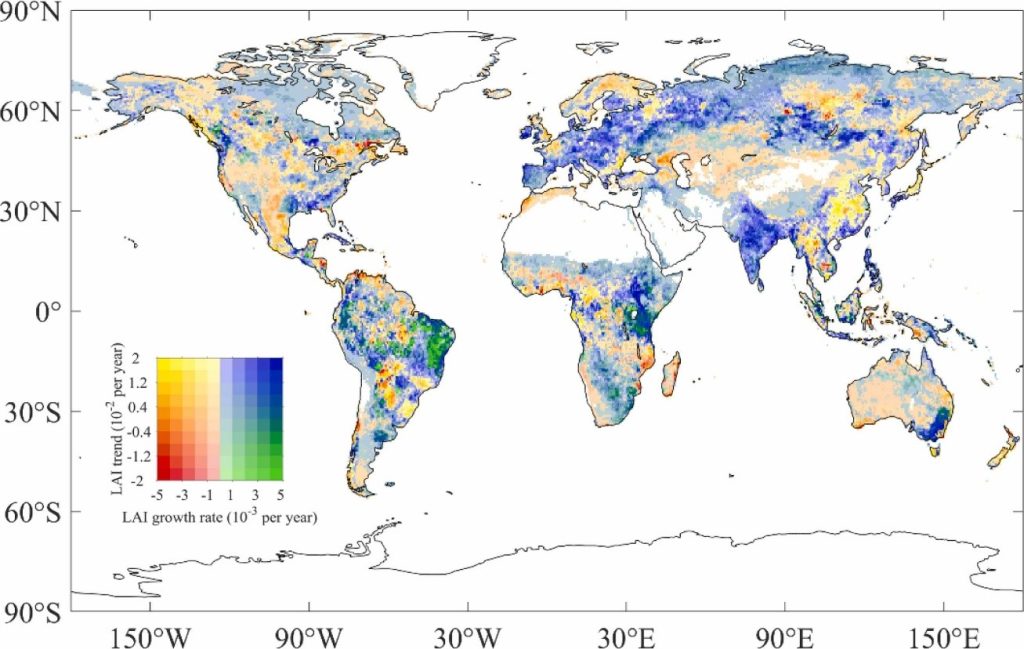
The CO2 fertilization effect was determined to be the main driver of the greening experienced across 76 percent of the planet.
Putting the findings in context, petro-physicist Andy May, who writes for Climate Intelligence, posted on X, “Global greening is not only a fact it is accelerating. Seven times more area is greening than browning. All studies agree the world has become greener since 1982. If things are getting better with fossil fuels, why end them?”
Since deaths linked to non-optimum temperatures, extreme weather events, and starvation have also declined markedly during the recent period of modest warming, I’d say May’s question is a pivotal for our time.
Sources: Global Ecology & Conservation; Climate Depot
Met Office Refuses to Retract Extreme Weather Lies

On January 22, Clare Nasir, a meteorologist who presents the weather on BBC Channel 5 and who blogs for the U.K.’s Met Office, claimed concerning storm Isha and storms in general, “when we see these storms they are more intense and that’s down to climate change.”
Paul Homewood, who operates the popular climate blog, Not A Lot Of People Know That, recognizing that data consistently shows this claim is false, filed a Freedom of Information (FOI) request requiring the Met Office to document or provide evidence to back up Nasir’s claim.
Responding to Homewood’s FOI, the Met Office was forced to admit that they have no such evidence. The response, in fact, referenced the Met Office’s own UK Storm activity report which says “there is no compelling trend in maximum gust speeds recorded in the UK since 1969.” The same report noted that much more severe storms had struck the U.K. in the 1980s and 1990s, more than 20 years of global warming ago, than have struck in recent years.
The Daily Sceptic covered the story, requesting comments on three different occasions concerning Nasir’s claim, noting that the issue was important because “[f]alse information of this kind does much to induce climate anxiety in the population and I am sure you would agree such errors should be corrected by any reputable organization.” The Met office has ignored the Daily Sceptic’s queries.
After the Met Office admitted that its data undermines Nasir’s claim that storms are getting worse, the Global Warming Policy Foundation called on the Met office to retract its spokesperson’s claim. It has not done so, thus far.
The Met office has been repeatedly caught up in illegitimate climate shenanigans, as far back as the Climategate scandal. More recently, the Daily Sceptic documented that the Met office adjusted out of the record the widely acknowledged global temperature pause from 2000-to-2014 “by adding 30% extra warming on a retrospective basis to its HadCRUT5 record,” and it recently suggested that it was considering “ditching the measurement of changes in temperature using data from the past 30 years in favour of a measurement compiled with 10 years’ past data and 10 years’ future modelled estimates,” in order to hype the claim the Earth has breached the politically designated 1.5°C threshold for climate disaster contained in the Paris climate agreement, in order to justify calls for more rapid, steeper, emission cuts to avert supposed disaster.
Climate Realism has posted hundreds of articles refuting claims that various types of extreme weather events are occurring more frequently or that when they do strike, they are more severe, often citing data and language contained in the Intergovernmental Panel on Climate Change’s most recent Sixth Assessment Report.
Commenting on the recent bruhaha stirred up by the Met Office’s refusal to retract the false claims made by its spokesperson speaking in her official capacity, Roger Pielke, Jr., Ph.D., wrote:
People are going absolutely nuts these days about extreme weather. Every event, anywhere, is now readily associated with climate change and a portent of a climate out of control, apocalyptic even. I’ve long given up hope that the actual science of climate and extreme weather will be fairly reported or discussed in policy—nowadays, climate change is just too seductive and politically expedient.
Sources: Daily Sceptic; Global Warming Policy Foundation
Podcast of the Week
A recent study by Jack McPherrin from Heartland explores how state legislatures, in adopting provisions of the Universal Commercial Code, have enabled “too big to fail” banks to seize the private retirement accounts of both individuals and institutional investors during times of crisis.
Subscribe to the Environment & Climate News podcast on Apple Podcasts, iHeart, Spotify or wherever you get your podcasts. And be sure to leave a positive review!


